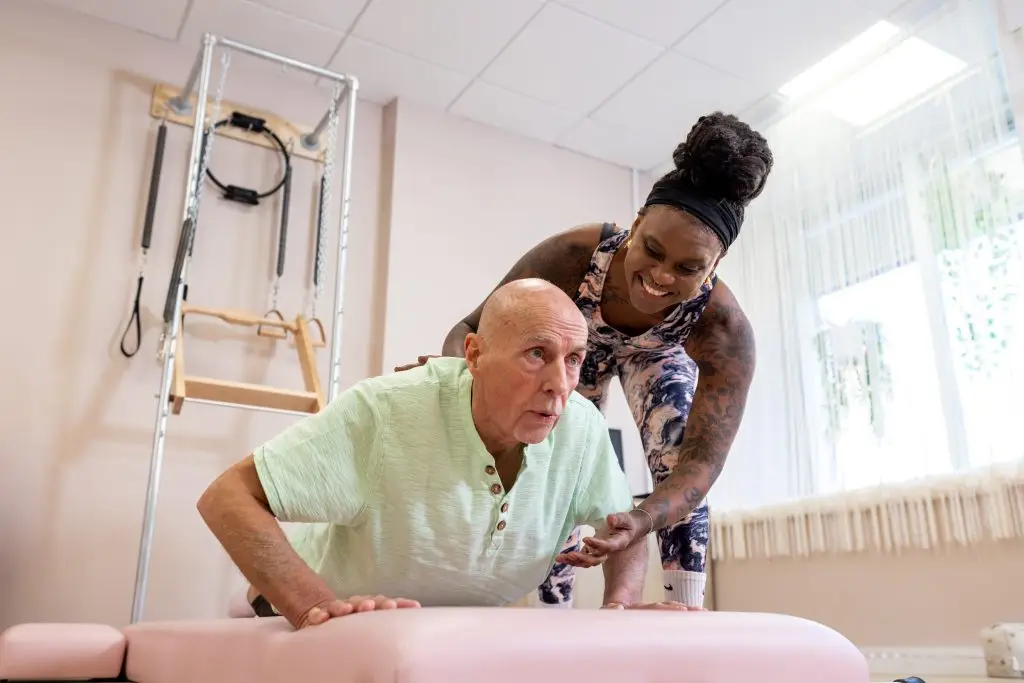How movement could help the body fight cancer
Dr David Bartlett explains the benefits of exercise during chemotherapy

A study from the University of Surrey and Royal Surrey NHS Foundation Trust, led by CIMSPA Conference speaker Dr David Bartlett, has found that exercise during chemotherapy could help the body’s immune system fight cancer more effectively. It’s an exciting step forward in showing that physical activity isn’t just good for quality of life during cancer treatment, it may also play a role in how the body responds to the disease itself.
The study involved 22 people with oesophageal cancer who were undergoing chemotherapy before surgery. Half of them took part in a structured, supervised exercise programme which included two sessions per week focused on building aerobic fitness and strength, while the other half continued with standard care.
After treatment, researchers compared the tumours that were removed during surgery. They found that those who had exercised had more of the body’s ‘fighter’ immune cells present in the tumour tissue. These immune cells, particularly the CD8+ T cells and natural killer cells, are the body’s own defence force against cancer.
Even more interestingly, the people who improved their fitness the most were also the ones who showed the strongest immune response. In a few cases, the tumours had even shrunk more than expected. While it’s still early days, this suggests that exercise could directly support the body’s ability to respond to cancer treatment.
Dr David Bartlett, Senior Lecturer of Exercise Immunology and Head of Exercise Science Research, School of Biosciences and Medicine, University of Surrey and Adjunct Assistant Professor of Medicine at Duke University, North Carolina, said:
“We found that the fitter a person became, the stronger their immune response inside the tumour. In fact, the more a patient improved their aerobic fitness, the more immune cells we found as well as signs of mature tertiary lymphoid structures, which are immune hubs linked to better responses. It’s hard not to be excited by these results, but we need to confirm them in a larger clinical trial.”
A reminder for professionals
For those working in the physical activity and exercise sector, especially in clinical or rehabilitation settings, this research is a reminder of just how powerful movement can be. Exercise isn’t just about helping someone feel better; it also changes what’s happening inside the body.
This study adds to a growing body of evidence showing that physical activity has biological as well as psychological and functional benefits during cancer care. It also highlights the crucial role of professionally recognised specialist activity professionals who can safely and effectively support people through treatment.
Here are some key points for our sector:
Exercise can be part of treatment, not just recovery
Traditionally, exercise programmes for people living with cancer have focused on improving fitness, reducing fatigue and maintaining independence. This research suggests that exercise could play an active role in treatment, helping the body fight disease alongside chemotherapy.
Supervision and expertise are essential
These sessions were carefully planned and supervised by specifically trained professionals, which is a reminder that safe, effective support requires specialist knowledge. Working with people undergoing chemotherapy brings unique challenges, and professional standards are vital.
The right timing makes a difference
Participants exercised throughout their chemotherapy and in the weeks before surgery. This shows how important it is to embed physical activity early in the cancer pathway, not waiting until after treatment to begin.
So what’s next?
A larger follow-up study, called OPTIMUS, is now underway. It will explore whether different exercise intensities have different effects, and how to design programmes that are practical for more people to take part in.
The results could help shape future cancer care and create new opportunities for professionally recognised activity professionals to be part of multidisciplinary oncology teams.
While the study is small, it adds to the growing recognition that movement is medicine. For people going through one of life’s toughest challenges, exercise can offer hope, strength and potentially a stronger immune response.
For our profession, it’s another step towards integrating physical activity into mainstream healthcare. As this research develops, the expertise of practitioners who are trained, and recognised will become even more important in helping to deliver safe and effective programmes for people living with and beyond cancer.










